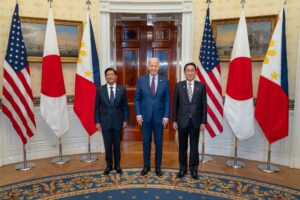The United States will set up an economic corridor on the main island of Luzon — the first of its kind in the Indo-Pacific region — to enable coordinated investments in high-impact projects, with assistance from Japan.
The corridor under the US’s Partnership for Global Infrastructure and Investment (PGI), an initiative under the Indo-Pacific Economic Framework, will connect the capital Manila, the southern Luzon province of Batangas, Subic Bay, and Clark, US President Joseph Biden with Philippine President Ferdinand R. Marcos, Jr, and Japanese Prime Minister Fumio Kishida said in a joint statement after their first-ever trilateral summit on Apr. 11.
The economic corridor will focus on high-impact infrastructure projects such as rails and ports and strategic investments involving semiconductors, clean energy, and supply chains, according to the joint statement.
The three leaders said Tokyo has long been supporting connectivity in Luzon through the Japan International Cooperation Agency (JICA). “We plan to work with multilateral organizations and the private sector to attract quality, transformative investments.”
Mr. Biden, Mr. Marcos, Jr., and Mr. Kishida said they intend to hold a trilateral event to promote investment in the proposed Luzon Corridor on the sidelines of the Indo-Pacific Business Forum in Manila in May.
The US will set up a steering committee to accelerate the work on the proposed Luzon corridor, they said. The US Development Finance Corporation will also open its first regional office in the Philippines as part of the project.
“The Luzon Corridor is a demonstration of our enhanced economic cooperation, focused on delivering tangible investments across multiple sectors,” the three leaders said. “Japan, the Philippines, and the US are also partnering to expand cooperation and investments in other areas of the Philippines.”
Open RAN
The three leaders said the US and Japan will be providing at least $8 million to establish Open Radio Access Network (ORAN) field trials and an Asia Open RAN Academy in Manila, building on prior US and Japanese investment of over $9 million for similar projects.
These projects would “enable future commercial deployment and an open, interoperable, secure, reliable, and trusted information communications technology ecosystem in the Philippines,” they said.
The interoperability-driven technology aims to create a global community of mobile network operators and vendors in the RAN industry.
They said Tokyo is “seriously considering” further investments for the potential commercial deployment of Open RAN technology in the Philippines.
The Philippines seeks to pilot Open RAN in its national broadband program and free Wi-Fi project.
The three allies plan to hold their first-ever trilateral cyber and digital dialogue within the year.
SEMICONDUCTORS
The US and Japan also plan to pursue a new semiconductor workforce development initiative, “through which students from the Philippines will receive world-class training at leading American and Japanese universities.”
The initiative seeks to complement the expansion of semiconductor investments in the Philippines that would strengthen supply chain resiliency among the three nations.
Manila and Washington would coordinate efforts to develop and expand the Philippine semiconductor workforce under the American CHIPS and Science Act’s International Technology Security and Innovation Fund.
The 2022 law provides $52.7 billion in federal subsidies to restore semiconductor manufacturing in the US and encourage chipmakers to relocate from China back to the US or to other friendly countries.
NUCLEAR ENERGY
The three nations also seek to expand partnership on safe and secure civil-nuclear capacity building, according to the joint statement.
Washington and Tokyo would help advance the Philippines’ civil nuclear energy program through a trilateral dialogue this year.
“Under the Foundational Infrastructure for Responsible Use of Small Modular Reactor Technology (FIRST) program, the United States and Japan plan to co-host a nuclear energy study tour in Japan for nuclear experts and policy decision-makers from the Philippines and other FIRST partner countries,” they said.
INVESTMENTS COMING
Philippine Ambassador to the US Jose Manuel D. Romualdez on Wednesday said Manila may secure as much as $100 billion in investments in the next five to 10 years as it pursues a three-way partnership with Tokyo and Washington.
The expected investments would cover energy, semiconductors, infrastructure, and the digital economy, he said.
Last month, a high-level delegation of US companies led by US Commerce Secretary Gina Raimondo vowed to invest $1 billion in the Philippines, spanning electric vehicles, digitization, and green energy.
DISPUTED WATERS
Mr. Marcos has increasingly turned to the US and its allies in the region such as Japan and Australia amid worsening ties with China, which claims the South China Sea almost in its entirety.
The US and Japan have been at the forefront of international condemnation of Chinese ships’ harassment of Philippine vessels deployed for resupply and rotation missions within Manila’s exclusive economic zone.
Mr. Biden reiterated that his country’s defense commitments to Japan and to the Philippines are “ironclad.”
“As I said before, any attack on Philippine aircraft, vessels or armed forces in the South China Sea would invoke our mutual defense treaty,” the US President affirmed.
MARCOS x BIDEN
Mr. Marcos and Mr. Biden held a separate meeting, where the two leaders “reviewed new initiatives to enhance economic and energy security.”
The two countries also talked about ways to “bolster maritime cooperation” and “invest in critical infrastructure,” according to a White House readout.
They also reinforced “their shared commitment to promote democracy, human rights, and labor rights.” – Kyle Aristophere T. Atienza
